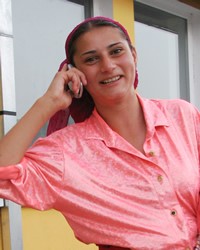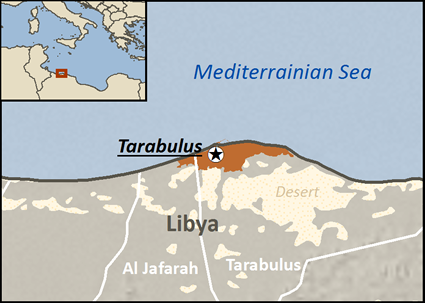Romani or Domari, comprise two groups: the Ghorbati and the Nawari. Both groups speak a dialect of the language called Romany, which is related to Punjabi and Rajasthani, both South Asian languages. Their dialect, Domari, contains many Arabic words. Romani speakers call themselves Rom, which in their language means "men." They derive Rom from the word Dom, meaning "a man of low caste who gains his livelihood by singing and dancing."Romani speaking people originated in India where their ancestors worked as musicians, entertainers, and metal workers. They were discriminated against and excluded from Hindu temples. Later, they were sent to Persia as minstrels. From there, the Romani separated into two groups. One traveled northward and became the Romany-speaking European Romani. The other traveled southward and became known as the Domari, or Middle Eastern Romani. That is also the name of their language. The latter group lives in Turkey and other countries in Central Asia. There are many in the Arabic speaking countries: Syria, Lebanon, Iraq, Libya, and especially Egypt.
The Romani live scattered throughout much of the world, including Libya. Because of the ongoing civil war, job opportunities are scarce, and the Domari people often look elsewhere for work. It is common for Romani to have two or more specialized occupations. This makes it easier for them to adapt to a changing society's needs. When a region's people no longer need a Romani's particular skill, they move on to find another community that needs their skills, be it metal working, entertainment or whatever.
People often associate the Romani with their abilities as musicians, singers, and dancers. They also hold a wide variety of other occupations. The men are skilled makers of sieves, drums, bird cages and reed mats. They also entertain with animals, work as tinkers or play music. The women sometimes sell such things as cloth, shoes, kitchen utensils, or other products made by Romani men. Many also sing and dance. Both men and women shear sheep, spin wool and tell fortunes. Women and children are forced to beg for food as a means of survival.
There are some Romani villages and communities in the Middle East. Some also live in the cities and have become an integral part of urban life. The settled Romani usually live in houses that are typical to those of the region in which they settle.
Romani marriages usually take place between couples in their teens. Romani people consider sexual purity a must for young women. Before she is married, her family must be proof that she has never been with a man.
The Romani in Libya are usually Muslim, and they follow the practices and beliefs of the Islamic faith. The traditional beliefs of the Romani such as that ghosts, lizards and snakes can harm humans, that men have the power to curse others by giving them the "evil eye," and that some people have the power to heal the sick are no longer held by most Romani.
The quality of health care, nutrition, housing, and education is poor, especially those who live in refugee camps. Believers with the right skills could be a blessing to the Romani by providing some of these needs. Their nomadic lifestyle has made it difficult for workers to reach them. The Islamic religion is very difficult to influence. All they have are Bible portions in their language. Christian workers need to teach them how to live lives pleasing to God. They also need to be taught useful job skills that they can use in Libya.
Pray for the Domari culture to be renewed and enhanced by a work of the Holy Spirit and shaped into a God-centered and God-honoring mold.
Pray for the Holy Spirit to move among Domari family and community leaders in Libya to seek his face and enjoy his blessings.
Pray for the Lord to thrust out workers who will be compelled to nurture a movement to Christ among the Domari people.
Pray that their dire conditions will soon lead the Domari to seek the One True God who yearns to give them the peace and joy of the Lord.
Scripture Prayers for the Romani, Domari in Libya.
https://en.wikipedia.org/wiki/Doms_in_Libya
https://books.google.com/books?id=8CAv53wlHfoC&q=syria+nawar+gypsies&pg=PA71
https://en.wikipedia.org/wiki/Languages_of_Libya
| Profile Source: Joshua Project |


























